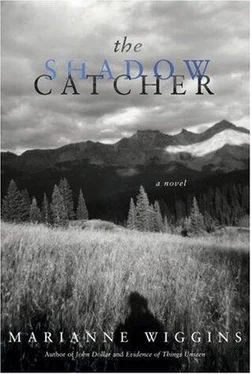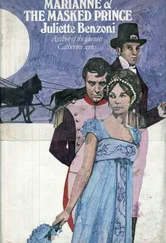Ellen was already shooing at them, “Go away. No make-ee business today. Edward no here. Go, go —” while Asahel helped Clara down from the buckboard, meeting her expression of alarm with the explanation, “Friends of Edward’s. He finds work for them.” Then Hercules came running from the barn, exclaiming, “Clara! They have horses here!” and Clara was trying to calm his excitement as they went up the porch steps past the Indians into what she supposed was meant to be a kitchen.
The floor was some kind of uneven stone, there was a hearth, a stove, a copper basin, hanging pots and brooms, a long pine table with two benches, shelves lined with mismatched plates and tin enamelware, and two glass-fronted highboys painted pink and yellow. “Come, Amelia, come,” Ellen beckoned and led Clara from the kitchen toward a narrow passageway that led to other rooms. Clara followed her into the first room on the left, larger than expected, nearly the size of the kitchen, with a glazed tile stove in one corner and a matrimonial-size bed in the center of the floor. “You take this room, Amelia,” Ellen said, gathering up what few personal belongings there were from the bureau and the hat rack. “I’ll move in with Eva.”
“—no, mother, no ,” Eva urged, appearing in the room, taking Ellen by the arms to stop her and entreating Clara with her eyes. “— please ,” she whimpered.
“Oh, no, we’ll be fine. I never liked it in here, not after that first night. Amelia needs this larger room for all of her nice things.”
Eva turned to Clara. “Tell her you are not Amelia ,” she begged, her eyes blazing, and although Clara understood her despair at having to share her privacy, at her age, with her dotty mother, a purely selfish impulse rose within her. She could see herself living in a room this size, alone, filling it with her own thoughts and memories, making of it a refuge from this strange place and this strange family, and, involuntarily, her gaze flitted to the door to see if there was a lock on the inside. There was. “Aunt Ellen,” she said, only halfheartedly, “you must let Eva have a room of her own. And you must stop calling me Amelia.”
“Well, what should I call you, dear?”
“Clara.”
“Don’t be silly, dear.” She continued gathering her pile of things. “Eva, tell your brother to bring Amelia’s trunk in here.”
Eva glared at Clara. “It’s not fair,” she said.
“Don’t expect me to talk sense into her if you can’t,” Clara answered, which set the record straight. “Now show me the rest of the house so I can figure all this out.”
As her mother had done with the disarray of Ellen’s life back in St. Paul, so Clara would do in these new circumstances, with Asahel’s and Edward’s commission and approval, of course, as she believed that both of them had grown into responsible young men, capable of solving problems for themselves. But on the distaff side, the day-to-day and largely female running of the house, Clara had assumed hierarchical supremacy from the moment Ellen fainted on the railroad platform. She and Eva held a delicate truce, Eva chafing in her supportive role but still pleased to exercise her exclusive right to play the helpless ingenue. It became a predictable split among the six of them (counting Hercules), a division of daily life and daily labor along gender lines. Even without Edward present on the compound, his influence was felt in the way he’d organized the structures, organized the buildings. The house was built around the kitchen and the sleeping rooms for, originally, the oldest and the youngest members of the family. The barn was built around himself. The barn was where the tools were stored, the horses and the mule were stabled — and it was where Edward, and, subsequently, Asahel, retreated every night to hunker down among the leather and the steel and the smell of animals to sleep as men . And that was where Hercules, from the first day, as soon as he had seen the cowboy-like bunkhouse rooms beside the stalls and stacks of hay, had wanted to be at night. With the animals. And with the men. With Asahel, who assured her it was civilized out there, proper sheets and blankets on the beds, but Clara said she’d have to see it. She would see it, first, before she gave permission. “‘No Girls Allowed,’” Hercules had told her, “there’s a sign up on the wall.”
“I’m not a girl, I am your guardian,” Clara had reminded him.
“He cries, sometimes, at night,” she’d confessed to Asahel, so he’d let her in. And it was wonderful, far better than the windowless room allotted to him at the dark end of the narrow passageway in the house. “If I hear him crying,” Asahel had told her, “I will come and get you.” He had moved to touch her hand with his, but then retracted it. So it had happened, from the first day, that Hercules had been adopted into the all-male brotherhood of the barn, and Clara had unpacked her Icarus trunk, her father’s paintings and her mother’s embroidered linens in the room that had been built by Edward to consummate the future happiness and solace of his parents. On her first night there, she’d realized that the house, with this arrangement, was occupied, solely, by women and that if there should be an unexpected occurrence in the dark, an intruder or a bear or fire or a snake, there was no man inside to help. She’d unpacked Amelia’s tea set and placed it, ceremoniously and showily, on the center shelf of one of the highboys in the kitchen, and then she’d unpacked Amelia’s sewing basket and placed the razor-sharp steel scissors defensively beneath her pillow. Then on the third night there, before she’d accustomed herself to the natural terrifying sounds that a strange house makes, she’d been woken from a dead sleep by the noise of something moving in the kitchen. She’d closed her fingers on the scissors and had sat up, stopping her breathing so she could listen better. And there it was: a vocative murmuring, like a dove, perhaps, or an owl, and then the scraping of a chair leg or the bench across the stone floor, and then a precise and chilling clinking noise, one she knew inarguably, from experience, as the sound of a fine china cup striking a fine china saucer.
Not really thinking what she’d do if there were an actual intruder, Clara had made her way into the passageway in the dark, her bare feet stinging on the cold stone floor, her hand around the scissors, holding them as if their double blades were a single-edged knife, and was surprised to see the fluid shadows of a lantern’s light playing on the floor in front of her, coming from the kitchen. Still not weighing the consequences she burst upon the scene, scissors raised above her head, to discover the two Indians at tea, sitting at the long pine table with her mother’s cups and saucers in their hands, a jug of whiskey between them and, to her right, a redheaded man, tall, his suspenders down around his waist, standing at the copper basin, shirtless, shaving. He’d turned to her, his razor in his hand, his face and beard half lathered, and all she would remember would be the color of his eyes, a blue more honed, more steely and more deadly than the weapons both of them were holding. Edward , she had realized.
He neither moved nor said a word but his gaze, steady and unwavering, bored into her, showing no emotion, as if he were a pane of glass passively returning her reflection, and she suddenly realized she must look a fright, like a woman from a madhouse, her linen shift open at the neck, her hair in disarray around her shoulders. She brought the scissors down to her side and took a small step backward, uncomfortable in his gaze and suddenly aware that not only he but all of them, the Indians, too, were staring at her. I’m Clara. I heard a noise , she wanted to say, but couldn’t, her heart suddenly too large in her chest for her to catch her breath. She took another tiny step, lifting her feet from the cold stone to warm them, and her eyes involuntarily left Edward’s and fell once more on the Indians. She parted her lips, once more trying to speak, and turned back to Edward, the unspoken thought, she knew, flashing in her eyes: They’re using my mother’s china .
Читать дальше











